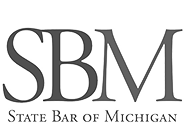What Happens To My Driver’s License During And After My OWI Case In Michigan If I Have Given A Breath Or Blood Sample? What If I Refused?
If you’re charged with Operating Under the Influence, you don’t immediately lose your license. The officer will give you a temporary driving permit if you cooperated by taking a breath test or urine test. The paper permit allows you to drive unrestricted (as long as your driver’s license was unrestricted prior to getting stopped) during the pendency of your case. You won’t be reissued a picture license until the end of your case.
If you refused a chemical test (urine, blood, or breath) back at the station, then they give you a piece of paper called a Failure to Submit to a Chemical Test Notice. You have two weeks (14 days) from the date of that notice to object to it with the secretary of state. If you do object, then they’ll set you up for an Implied Consent Hearing with the secretary of state, which is separate from your criminal case at the court. If you win that appeal, then your license is still valid pending the outcome of the criminal case. If you lose at the Implied Consent Hearing, then you have the right to appeal to the circuit court in the county where you live to ask a circuit court judge to give you a restricted license. You may be granted a restricted license if you haven’t had any prior implied consent refusals or drunk driving incidents.
There are three different types of drunk driving cases. First, 1. Impaired Driving, which is 0.08 or more of a Blood Alcohol content (BAC), and if you’re convicted, you face up to 93 days in jail and your license will be suspended for 90 days. You are, however, granted a restricted license by the secretary of state to drive to and from work, emergency medical appointments, school, and court—basically anything the court considers necessary. Second, 2. Operating While Intoxicated (OWI). It carries a maximum jail penalty of up to 93 days in jail, but there’s also a six-month suspension on your license with no restricted license for the first 30 days. After 30 days, you’ll be able to get a restricted license.
Third, OWI High BAC or commonly known as “Super Drunk Driving”, which is a BAC of 0.17 or higher.
If you get convicted of an OWI with a high BAC or Super Drunk Driving, then your license is suspended for a year, and you can only receive a restricted license after 45 days, but will have to install an interlock device in your vehicle. Any time that you want to drive, you’ll have to blow into the device to determine if you’re under the influence.
Will I Be Able To Get Limited Driving Privileges While My DUI/OWI Case Is Pending?
If you have an otherwise-valid license with no restrictions, your driving ability won’t change, pending the outcome of your case. The only thing that could suspend your driving privileges would be a refusal of a chemical test.
Is It Possible To Have My OWI Charge Reduced To A Lesser Offense?
There are three different drunk driving charges, as I mentioned. A reduction of an OWI charge might be to Impaired Driving, which is still a misdemeanor with criminal penalties. Impaired Driving, however, comes with lighter license sanctions and responsibility fees owed to the state.
Sometimes, you can get an OWI reduced down to a Reckless Driving charge, which is also still a misdemeanor. Years ago, when I was a prosecutor, the state was allowing us to reduce OWIs to Reckless Driving, but as a result, the state made the penalties for Reckless Driving worse, potentially more difficult to live with than the penalties for OWI. As an example, if you’re convicted of Reckless Driving, your license is suspended for six months with no restricted license available. In some cases, it’s better to get an OWI or an Impaired Driving if you want to have a restricted license.
Some drivers might be able to get their OWI reduced down to a civil infraction, Careless Driving, which carries three points on your license. But be careful of ever pleading responsible to a civil traffic infraction, because your insurance rates can go up significantly.
An Overview Of OWI Charges In Michigan
Drunk driving—it’s the crime that everyone has an opinion on and led to the creation of Mothers Against Drunk Driving. If you or your loved one has been charged with the crime of Operating While Intoxicated (OWI), what should you do now?
My name is Scott Weinberg, and I’m a former prosecutor. For the last 20 years, I’ve represented thousands of people who’ve been charged with drunk driving here in Michigan. I’m going to tell you exactly what you need to do to protect your rights and how to deal with the prosecutors and the courts.
Here in Michigan, we’ve got very strict drunk driving laws, so it’s important for every driver to know their rights. First, did you know that you have an absolute right to not answer any of the questions the officer might ask when he stops you? These questions include: “Where were you coming from?” and “How much did you have to drink?”
You also have no obligation to do any of the field sobriety tests. Asking you to touch your nose or say the alphabet—tests like that are geared toward getting evidence against you in court. All you have to do is be polite, hand them your driver’s license and your vehicle registration and insurance, and say you want to talk to your lawyer, period.
I know what you’re thinking. Why didn’t the police officer tell me I’m not obligated to answer questions or take field sobriety tests at the scene? You have to realize that the police are not on your side when you’re facing a drunk driving charge. They work for the government, so you need your own representative, a good attorney.
Next, let’s talk about the two different breath tests. There’s a roadside test called the preliminary breath test, or PBT for short. Again, you have no obligation to take a PBT. If you were to agree and you blow over 0.08, then that can be the probable cause the officer needs to arrest you. The next chemical test you’ll probably take is the breathalyzer back at the station. The results to this test are the ones that kill defendants in court. There are, however, ways to challenge the Breathalyzer result. For instance, the police have to have a certified operator doing the test, and the machine has to be inspected and tested. They also have to wait 15 minutes before the test is given to you to see if you put anything in your mouth. Those are just a couple of the ways that you can try to challenge a drunk driving case. You do have the right to refuse that breath test, but doing so comes at a cost: a one-year suspension of your driver’s license with no restricted license unless you win an appeal. If the police take blood from you, then there’s a whole different set of factors to consider. Again, it’s important to know your rights from the very beginning.
Finally, remember when you go to court that the prosecutor is going to assume that this is not the first time you drank too much and drove. The statistic they generally use is that anyone caught driving over the legal limit has done it dozens of other times, not just the one time that they got caught. Again, keep in mind that the prosecutor is not your lawyer or your representative. He’s there to get a conviction on your record, so make sure that you’re properly represented in court.
For more information on OWI Charges in the State of Michigan, an initial consultation is your next best step. Get the information and legal answers you are seeking by calling (800) 710-0529 today.
Awards and Accolades



